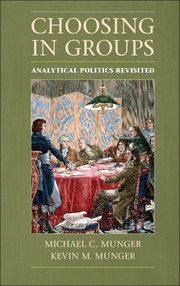Preface
Published online by Cambridge University Press: 05 February 2015
Summary
Preface
In 1997, Melvin Hinich and I coauthored a book, also published by Cambridge University Press, called Analytical Politics. It subsequently was translated into Chinese, Japanese, Korean, and Spanish. The book used spatial theory to bridge the gap between philosophical and mathematical treatments of politics.
We started to think about a second edition in the late 2000s. I had been a department chair at Duke University for ten years, and I wanted to get back to academic work. After Mel and I had a series of phone conversations, we planned to revise the first edition along the lines that Jeffrey Banks had suggested in an insightful review in the Journal of Economic Literature.
On Sunday, September 5, 2010, we talked on the phone. Mel was excited about the example we were planning to use to introduce the new book: the problem of group choice Meriwether Lewis and William Clark faced during their 1805 Corps of Discovery expedition. We hung up pledging to talk again later in the week.
But that never happened. On the morning of Monday, September 6, Melvin fell down the stairs in his home in Austin, Texas. He did not survive the fall.
After that, I put the book aside for more than a year. Mel had participated, over more than three decades, in the creation of many of the spatial models discussed in the 1997 book, and his sense of scientific advances in modeling was invaluable. I couldn’t do it without him.
- Type
- Chapter
- Information
- Choosing in GroupsAnalytical Politics Revisited, pp. xi - xiiPublisher: Cambridge University PressPrint publication year: 2015



